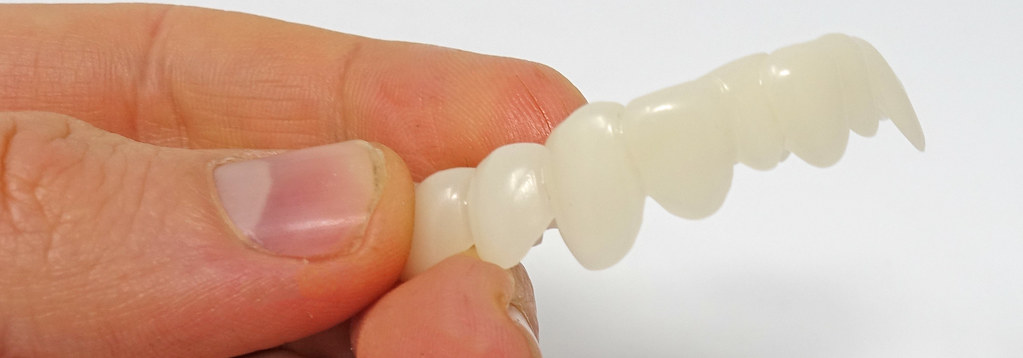If you have a lot of questions about veneers, such as – What are veneers? or What do teeth look like under veneers? Read on and find out.
What are dental veneers?
Veneers are custom-made covers that sit on the front of your teeth. They are made to mimic the natural appearance of your teeth for a pleasing aesthetic. Veneers conceal chips, cracks, gaps, stains, discolorations, misshapen teeth, and other imperfections. There are several types of veneers available, including porcelain veneers, composite veneers, no-prep veneers, and removable veneers.
Are veneers better than teeth whitening?
If you have yellow discoloration of your teeth or white spots on your teeth and want to do something it, there are several options available to you. The most common remedy is a professional tooth whitening treatment, which is quick and relatively inexpensive. However, teeth whitening may not last long.
A more permanent solution is dental veneers. But veneers are more expensive than teeth whitening and the treatment takes longer. Ultimately, it’s a personal decision. If you want a brighter smile for a special event such as a wedding, a whitening treatment might be a good option. On the other hand, if you have more widespread cosmetic concerns, such as gaps, cracks, and stains, veneers are worth considering.
Can you see your teeth through veneers?
You cannot see your teeth through veneers because veneers are made from opaque materials that are designed to mimic your natural teeth. Note: You may be able to see through ceramic veneers when you hold them up before they are attached to your teeth because they are extremely thin. However, once the veneers are attached to your teeth and your mouth has healed, most people cannot tell the difference between veneers and natural teeth.
What happens to your natural teeth under veneers?
Your natural teeth remain intact under veneers. Your dentist will shave a thin layer of enamel to prepare your teeth and create a foundation for the veneers. However, this does not involve touching the roots or nerves of the tooth. Veneer application does not damage your teeth.
Do teeth stay clean under veneers?
The front of your teeth that are under veneers are protected from food particles, sugars, acids, and bacteria. However, the other surfaces of the teeth are still exposed to these damaging substances. This means you need to follow good dental hygiene to maintain healthy teeth and gums. Also, it’s worth remembering that plaque can grow on veneers, so don’t forget to brush twice a day and floss daily.
Can you go back to natural teeth after veneers?
Traditional composite and porcelain veneers are permanent, so you cannot go back to your natural teeth once you get them. Your dentist needs to shave some enamel away to place traditional veneers on the front surfaces of your teeth. If you want a less permanent option, you can consider removable veneers. These are snap-on veneers that you wear like retainers. They hide imperfections but they can be taken off at any time.
What happens to veneers after 10 years?
Porcelain and composite veneers are durable, typically lasting 7-10 years (composite) and up to 20 years (porcelain). However, veneers eventually get worn down and have to be replaced.
What happens when veneers fall off?
If veneers fall off, you should get them replaced as soon as possible. Remember, your dentist has to shave some tooth enamel to place the veneers. If you don’t get a replacement, your tooth remains exposed, putting it at risk of irritation and infection.
Why is my tooth turning black under veneers?
Your tooth may be turning black under veneers due to improper bonding between the veneer and your tooth surface, leading to leakage under the porcelain. This allows bacteria and food particles to get in, causing discoloration. You should make an appointment to see your dentist and have the veneer replaced as soon as possible to prevent serious complications.
Do all celebrities have veneers?
All celebrities do not have veneers, but the secret behind many celebrity smiles is porcelain veneers. They look the most natural and last for up to 20 years.
If you’re interested in finding out more about the different types of veneers, Express Dentist has a nationwide network of dental professionals, including dentists who specialize in cosmetic dentistry. Call us today and we’ll put you in touch with a dentist in your area who can tell you if you are a candidate for this cosmetic treatment.
It’s worth noting that you can only get cosmetic treatments like veneers if you don’t have extensive tooth decay and gum disease. So, the first thing you should do is optimize your oral health with a visit to the dentist if it is overdue. Once the dentist gives you the all-clear in terms of good dental health, you can discuss veneers. Now that you know what veneers are and what happens to teeth under veneers, you are better prepared to ask your dentist more detailed questions.
About the author

Dr. Greg Grillo
Dr. Greg Grillo DDS studied at the University of Washington where he received a bachelors degree with Honors and later attended dental school on the same campus. Following school Dr. Greg served in the United States Navy as a dental officer. During this time he received advanced training in specialty areas of dentistry while also treating families of members of the military.
As well as sharing valuable information on dentistry and oral health, Dr. Greg remains a practicing dentist to this day. He works with families in the Okanogan Valley where he lives with his wife and three children.
- Dr. Greg Grillo
- Dr. Greg Grillo
- Dr. Greg Grillo
- Dr. Greg Grillo
- Dr. Greg Grillo
- Dr. Greg Grillo
- Dr. Greg Grillo
- Dr. Greg Grillo
- Dr. Greg Grillo
- Dr. Greg Grillo
- Dr. Greg Grillo
- Dr. Greg Grillo
- Dr. Greg Grillo
- Dr. Greg Grillo
- Dr. Greg Grillo
- Dr. Greg Grillo
- Dr. Greg Grillo
- Dr. Greg Grillo
- Dr. Greg Grillo
- Dr. Greg Grillo
- Dr. Greg Grillo
- Dr. Greg Grillo
- Dr. Greg Grillo
- Dr. Greg Grillo
- Dr. Greg Grillo
- Dr. Greg Grillo
- Dr. Greg Grillo
- Dr. Greg Grillo
- Dr. Greg Grillo
- Dr. Greg Grillo
- Dr. Greg Grillo
- Dr. Greg Grillo
- Dr. Greg Grillo
- Dr. Greg Grillo
- Dr. Greg Grillo
- Dr. Greg Grillo
- Dr. Greg Grillo
- Dr. Greg Grillo
- Dr. Greg Grillo
- Dr. Greg Grillo
- Dr. Greg Grillo
- Dr. Greg Grillo
- Dr. Greg Grillo
- Dr. Greg Grillo
- Dr. Greg Grillo
- Dr. Greg Grillo
- Dr. Greg Grillo
- Dr. Greg Grillo
- Dr. Greg Grillo
- Dr. Greg Grillo
- Dr. Greg Grillo
- Dr. Greg Grillo
- Dr. Greg Grillo
- Dr. Greg Grillo
- Dr. Greg Grillo
- Dr. Greg Grillo
- Dr. Greg Grillo
- Dr. Greg Grillo
- Dr. Greg Grillo
- Dr. Greg Grillo
- Dr. Greg Grillo
- Dr. Greg Grillo
- Dr. Greg Grillo
- Dr. Greg Grillo
- Dr. Greg Grillo
- Dr. Greg Grillo
- Dr. Greg Grillo
- Dr. Greg Grillo
- Dr. Greg Grillo
- Dr. Greg Grillo
- Dr. Greg Grillo
- Dr. Greg Grillo
- Dr. Greg Grillo
- Dr. Greg Grillo
- Dr. Greg Grillo
- Dr. Greg Grillo
- Dr. Greg Grillo
- Dr. Greg Grillo
- Dr. Greg Grillo
- Dr. Greg Grillo
- Dr. Greg Grillo
- Dr. Greg Grillo
- Dr. Greg Grillo
- Dr. Greg Grillo
- Dr. Greg Grillo
- Dr. Greg Grillo
- Dr. Greg Grillo
- Dr. Greg Grillo
- Dr. Greg Grillo
- Dr. Greg Grillo
- Dr. Greg Grillo




